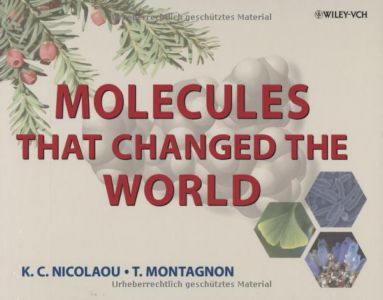Organic Compounds - Synthesis
In this delightfully designed book, K. C. Nicolaou introduces the world's most important molecules and shows in a fascinating way the role certain compounds have to play in our everyday lives in the fields of drugs, aromatics or vitamins. For example, he tells the story of Aspirin, beginning 3,500 years ago in Egypt, through to its first synthesis and various applications with many entertaining facts and details. Printed in full color throughout and with its oversize format, this is a must for every chemist, natural scientist and anyone interested in the sciences.
Forewords.
Preface.
Acknowledgements.
About the Authors.
Chapter 1. Introduction: Atoms, Molecules & Synthesis.
Chapter 2. Urea & Acetic Acid.
Chapter 3. Glucose.
Chapter 4. Aspirin.
Chapter 5. Camphor.
Chapter 6. Terpineol.
Chapter 7. Tropinone.
Chapter 8. Haemin.
Chapter 9. Quinine.
Chapter 10. Morphine.
Chapter 11. Steroids & the Pill.
Chapter 12. Strychnine.
Chapter 13. Penicillin.
Chapter 14. Longifolene.
Chapter 15. Prostaglandins & Leukotrienes.
Chapter 16. Vitamin B12.
Chapter 17. Erythronolide B & Erythromycin A.
Chapter 18. Monensin.
Chapter 19. Avermectin.
Chapter 20. Amphotericin B.
Chapter 21. Ginkgolide B.
Chapter 22. Cyclosporin, FK506 & Rapamycin.
Chapter 23. Calicheamicin ?1I.
Chapter 24. Palytoxin.
Chapter 25. Taxol.
Chapter 26. Mevacor, Zaragozic Acids & CP Molecules.
Chapter 27. Brevetoxin B.
Chapter 28. Ecteinascidin 743.
Chapter 29. Epothilones.
Chapter 30. Resiniferatoxin.
Chapter 31. Vancomycin.
Chapter 32. Thiostrepton.
Chapter 33. Small Molecule Drugs.
Chapter 34. Biologics.
Epilogue.
Image Credits.
Register of Persons.
Subject Index.
Product Description:
In this delightfully designed book, K. C. Nicolaou introduces the world's most important molecules and shows in a fascinating way the role certain compounds have to play in our everyday lives in the fields of drugs, aromatics or vitamins. For example, he tells the story of Aspirin, beginning 3,500 years ago in Egypt, through to its first synthesis and various applications with many entertaining facts and details. Printed in full color throughout and with its oversize format, this is a must for every chemist, natural scientist and anyone interested in the sciences.
K. C. Nicolaou is Professor of Chemistry at the university of California, San Diego and is Chairman of the Department of Chemistry and holds the Skaggs Professorship of Chemical Biology and the Darlene Shiley Chair in Chemistry at The Scripps Research Insitute. His impact on chemistry flows from his works in chemical synthesis and chemical biology described in over 550 publications and 55 patents.
Tamsyn Montagnon received her B.Sc. in Chemistry with Medicinal Chemistry from the University of Leeds, UK, which was followed by a move to the University of Sussex where she obtained a D.Phil in 2000. She was awarded a GlaxoWellcome post-doctoral fellowship and joined Professor K. C. Nicolaou?s group as a postdoc. She is now assistant professor at the University of Crete.
Editorial Reviews
Review
"A scientific journey encapsulating the most important aspects of the history of chemical discovery over the last 50 years". (MedicalNewsToday.com, 16 March 2008)
?In contrast to other books that target the general public and relate the importance of a limited number of compounds, Molecules That Changed the World will gain broader appeal among students of chemistry and those familiar with organic synthesis and natural products.? (Journal of Chemical Education, December 2009)
"Over 366 pages we meet more than 500 famous researchers and hear plenty of amazing tales about legendary molecules?. [For those] of us interested in this fascinating science the book is worth reading." (Lab Times, May 2008)
"The lay person and the dedicated student alike will take pleasure in reading the fascinating stories about legendary molecules ? .Enriching and highly rewarding." (Anticancer Research 28: 2008)
"This colorfully illustrated book will entertain students of all kinds, from undergraduates just beginning their studies to the serious practioner." (CHOICE, November 2008)
"For the synthetic organic chemistry, the book provides an opportunity to observe the beauty and innovation of synthetics approaches, as well as to appreciate the maturation of organic synthesis as a discipline. For the educator, the book will serve as a powerful resource for stories that can awaken sleepy undergraduates to the history of science and to the possibilities that await the scientists of tomorrow. A reader with a modest familiarity with organic chemistry will appreciate, in addition to the history of individual molecules, the stories about individual scientists, whose dedication, passion, and insight moved chemistry and, in many cases, all of science forward." (Bulletin for the History of Chemistry, Volume 22, Number 2, 2008)
"This book will sit proudly on my shelf, and I fully expect it to be a useful reference source. I hope that will be true of schools and colleges too." (Chemistry and Industry, June 2008)
"The book?s style and content are more accessible than is the case for most other books on synthetic organic chemistry that you?re likely to encounter." (Chemical and Engineering News, June 2008)
"This book will change the attitudes of many to science." (Chemistry in Australia, June 2008)
"I found this book a highly enjoyable read. This fresh approach should be applauded and will no doubt become a classic in its own right." (Chemistry World, June 2008)
"This book will no doubt educate, inspire and motivate?" (Angewandte Chemie, 2008-47/18)
"...delightfully designed book?" (Portal f?r Organische Chemie, Feburary 2008)
"You will meet for instance Milan Uskovivic, who prepared desoxyquinine or Leo Sternbach the ?father? of the benzodiazepines too. Happy reading!" (RoSearch, April 2008)
"This book is a true treasure chest of information, chemical and non-chemical?" (ChemMedChem, April 2008)
"A wonderfully suitable gift for anyone who is interested in chemistry, and will serve to enhance that fascination and interest." (Organic Chemistry Portal, March 2008)
"A scientific journey encapsulating the most important aspects of the history of chemical discovery over the last 50 years." (MedicalNewsToday.com, 16 March 2008)
